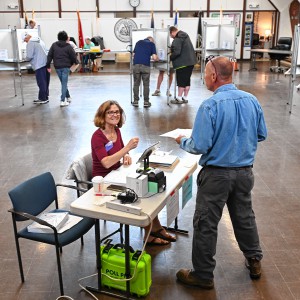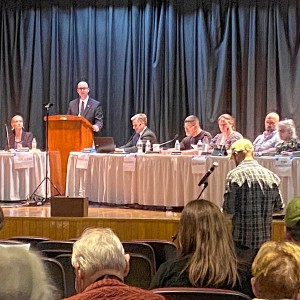Connecting the Dots: Looking for legitimate leadership
| Published: 07-07-2023 2:26 PM |
One cannot avoid the local, national, or worldwide focus on/obsession with this thing we call leadership. Those running/grasping for office and the rest of us looking for legitimate leaders. How do we determine what legitimate leadership is?
I think we might all agree that all leaders, to a certain degree, do the same thing. Doesn’t matter if it’s a president, corporate executive, schoolteacher or mayor, leadership is about guiding and impacting outcomes. About enabling groups of people to work together to accomplish what they can’t do on their own.
Leadership is about what you do, not who you are. Some people in formal leadership positions are poor leaders while many people exercising leadership have no formal authority. It is their actions, not their words, that inspire trust, energy, and outcomes.
Hundreds of books have been written about leadership. They all extol the necessity for a leader’s vision and purpose with the enthusiasm and passion to lead others. The necessity for integrity and authenticity, empathy and emotional intelligence to “speak” to team members. For the willingness and confidence to empower by delegating responsibilities. And finally, to recognize and acknowledge the contributions made by team members. These elements serve as a foundation for creating legitimate leadership that can motivate and influence others to achieve great things.
Inspired legitimate leadership is not a one-size-fits-all concept. Different leaders can exhibit different qualities and approaches. Innumerable studies, however, have shown that leadership is not something people are born with. It is a skill one can learn.
I have been privileged to work in the performing arts world for most of my career. I have witnessed the coming together of extraordinary people with powerful beliefs about how to express themselves through theatre, music and dance. There is always a singular visionary in each of these performing arts organizations that translates personal artistic vision into public expression.
My takeaway about what is essential to legitimate leadership is the capacity to see around the corner of the usual while, at the same time, responding to the desire of those one has been engaged to lead.
Achieving what the playwright, choreographer or composer has envisioned requires a director, a choreographer and a music director who believes passionately in the creator’s work and who has a “vision” of how the play, musical, dance or composition can be realized on stage.
Article continues after...
Yesterday's Most Read Articles
 Political newcomer defeats Shores Ness for Deerfield Selectboard seat
Political newcomer defeats Shores Ness for Deerfield Selectboard seat
 South County Senior Center opts not to renew church lease after rift over LGBTQ program
South County Senior Center opts not to renew church lease after rift over LGBTQ program
 More than 130 arrested at pro-Palestinian protest at UMass
More than 130 arrested at pro-Palestinian protest at UMass
 As I See It: Between Israel and Palestine: Which side should we be on, and why?
As I See It: Between Israel and Palestine: Which side should we be on, and why?
 Moratoriums on large-scale solar, battery storage passed in Northfield
Moratoriums on large-scale solar, battery storage passed in Northfield
 Bridge of Flowers in Shelburne Falls to open on plant sale day, May 11
Bridge of Flowers in Shelburne Falls to open on plant sale day, May 11
Getting from that vision to opening night demands a kind of leadership rarely found elsewhere. First, the “leader” must inspire trust in every single player. This requires integrity and authenticity, empathy and emotional intelligence and the capacity to “speak” to everyone whose role and function is essential to making the creator’s vision public. No weak links. Second, the performance can never happen if the leader lacks the willingness to empower others, to delegate responsibilities and to recognize and appreciate the efforts made by all team members.
Leadership in the performing arts differs in many ways from leadership in other organizations. I find myself wishing that were not so. Leadership in the performing arts is intensely collaborative. Its leaders must work with multiple stakeholders with different artistic perspectives. They must rely on the input and feedback of their team members to shape the creator’s vision. I fervently wish that our political leaders on every level of government had the desire for collaboration that legitimate leaders in the performing arts all have.
Performing arts leadership is more dynamic: Leaders face a constantly evolving environment that requires them to adapt quickly and creatively.
The performing arts are more generative when it comes to leadership. Its leaders are creating something original that will impact their audiences and society. Its leaders must also balance achieving the desired artistic expression with financial realities and constraints.
I don’t have the space to describe the brilliant successes and failures I have witnessed during my long career in the performing arts. I have been gifted by visions that were given a life that resulted from a creative collaboration rare to find in traditional organizations. And almost never in today’s chaotic world of politics. Certainly nothing like the coming together of the legitimate leaders who gave us our Constitution — an ongoing work-in-progress.
Leadership that flows from the vision of a single individual has served the performing arts sector well for decades. Leadership that flows from a vision of our nation as articulated in the Constitution has served the American people well since 1787.
The current quest to kill that vision demands that we find and support legitimate leaders.
In his career as an arts administrator, John Bos has been a theatre and music producer, deputy director of performing arts for the New York State Council on the Arts and director of performance programming for National Public Radio. This has allowed him to meet and work with many extraordinary artists and arts organizations. “Connecting the Dots” is published every other Saturday in the Recorder. Comments and questions are always invited at john01370@gmail.com.
]]>

 My Turn: No good answers with utilities in control
My Turn: No good answers with utilities in control My Turn: Blame Hamas for the suffering of Palestinians
My Turn: Blame Hamas for the suffering of Palestinians Ahmad Esfahani: Democratic lagging
Ahmad Esfahani: Democratic lagging Evlyn Ashong-Katai: Back tax fund for elderly, disabled
Evlyn Ashong-Katai: Back tax fund for elderly, disabled
